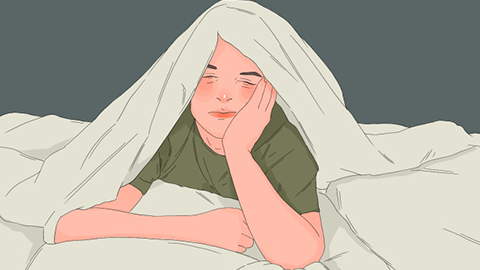What could be causing frequent awakenings during sleep at night?
Generally, frequent awakenings during sleep at night may be caused by factors such as poor sleep environment, unhealthy bedtime habits, neurasthenia, gastroesophageal reflux disease (GERD), or sleep apnea syndrome. It is recommended to seek medical advice promptly, identify the underlying cause, and receive symptomatic treatment under a doctor's guidance. Specific analysis is as follows:

1. Poor sleep environment: Excessive light, noise disturbances, or uncomfortable room temperature in the bedroom can disrupt sleep stability and lead to frequent awakenings. Draw blackout curtains to reduce light exposure, use earplugs to block out noise, maintain room temperature between 22–25°C, and choose breathable, soft bedding to create a quiet and comfortable sleeping environment.
2. Unhealthy bedtime habits: Consuming coffee or strong tea, overeating, or using smartphones before bed can stimulate nervous system activity and increase gastrointestinal burden, thereby disrupting sleep rhythms. Avoid eating within 2 hours of bedtime and refrain from drinking stimulating beverages. Turn off electronic devices at least one hour before sleep. Soaking feet in warm water or listening to soothing music may help relax the body and mind, promoting easier sleep onset.
3. Neurasthenia: Prolonged mental stress or excessive pressure may lead to neurasthenia, characterized by light sleep, frequent awakening, and symptoms such as dizziness and fatigue. Medications such as oryzanol tablets, vitamin B1 tablets, or Anshen Bunao Liquid may be used under medical supervision to regulate nervous system function.
4. Gastroesophageal reflux disease (GERD): Eating greasy foods before bedtime or lying flat after meals may cause gastric acid reflux, irritating the esophagus and causing discomfort that leads to nighttime awakenings. Under medical guidance, medications such as omeprazole enteric-coated capsules, lansoprazole enteric-coated tablets, or domperidone tablets may be used to alleviate symptoms.
5. Sleep apnea syndrome: Airway narrowing or obstruction causes breathing pauses during sleep, leading to oxygen deprivation that triggers arousal from sleep, often accompanied by snoring and daytime sleepiness. Continuous positive airway pressure (CPAP) therapy may be prescribed by a physician. In severe cases, surgical interventions such as septoplasty or tonsillectomy may be performed to widen the airway, improve ventilation, and reduce the frequency of nighttime awakenings.
Routine lifestyle adjustments include maintaining regular sleep schedules with consistent bedtime and wake-up times, avoiding excessive excitement or anxiety before sleep. Keep the bedroom well-ventilated, change bed linens regularly, minimize external disruptions to sleep, and gradually improve overall sleep quality.










